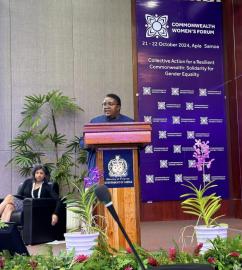
Deputy Minister in the Presidency for Women, Youth and Persons with Disabilities, Mmapaseka Steve Letsike, has emphasised the need for targeted interventions that integrate prevention, care, and treatment of mental health challenges, particularly for the youth.
Letsike was speaking at the Commonwealth Youth Forum (CYF), on Tuesday on the sidelines of the Commonwealth Heads of Government Meeting (CHOGM) currently underway in Apia, Samoa.
Letsike is leading the South African delegation at the 2024 CHOGM which is convened under the theme “Our Resilient Common Future: Transforming our Commonwealth”.
The CHOGM Samoa 2024, taking place from 21 to 26 October 2024, will feature several Ministerial Meetings, including 35 side events, four Forums, and the election of the new Commonwealth Secretary-General.
Addressing the youth forum, Letsike said that as part of the apex priorities for the youth, the Republic of South Africa has prioritised physical and mental health promotion among the youth as a basic human right.
However, the Deputy Minister noted that while many countries like South Africa are starting to put in place mental health policies, such policies often fail to provide for the needs of young people, as they are not adequately implemented.
“As the Republic of South Africa, we are keen to learn from nations in the Commonwealth on how mental health among the youth is addressed, particularly as we forge ahead with our own interventions. We have a responsibility, as governments of the world, to respond to the global mental health crisis among young people,” Letsike said.
Interventions promoting mental health
Letsike highlighted South Africa’s National Youth Policy which proposed interventions that would promote mental health and these include:
• Introducing compulsory physical education to promote healthy lifestyle and combat diseases such as diabetes, hypertension, and obesity.
• Providing recreational facilities, including gyms and sporting facilities in communities.
• Having onsite community and institution-based professionals to provide psycho-social services which strengthen families and address social ills such as mental health, substance abuse, crime, bullying, gender based-violence, rape, racism, and other forms of discrimination.
• Increasing awareness of therapy and counselling services for children, adolescents, and youth, including those in disadvantaged and rural communities.
• Extending programmes and services to support parents and guardians of affected children and youth.
• Increase awareness on counselling services for children, adolescents and youth, including for youth in disadvantaged and rural communities. These include ISHP services, community-based mental health services provided by NGOs, Childline and the South African Depression Action Group (SADAG).
• Department of Health to establish community-based mental health institutions for provision of these services and they should be given names that do not attract stigma to patients.
• Introduce a dedicated 24/7 confidential service toll-free numbers accessible to youth seeking counselling services. Chat services with lay counsellors, youth workers, psychologists, mental health therapists or professional counsellors on platforms such as WhatsApp/Messenger are useful and can be linked to geographic information system (GIS) to identify the location of the user and offer immediate response in case a person has suicidal ideation or other mental health challenges. Such services were advertised widely during pandemic lockdown and should be expanded, rolled out and implemented beyond pandemic.
• All role players must view the mental health issue broadly using the public health lens, and deal with the root causes of challenges facing youth, such as high levels of gender-based violence, drug-abuse, suicide, crime, experiences of racism or other discrimination, and the psyche of unemployed young people.
Letsike said the interventions must be comprehensive, consistent, and adequately meet young people’s mental health needs.
She emphasised that professional counsellors, psychologists, psychiatrists, specialist nurses, and other trained staff must be prepared with adequate information to ensure quality care provision.
“These professionals must also collaborate with young people, their families, and communities, particularly in dismantling the current power imbalances and patterns of oppression, discrimination, and exploitation.
“We cannot wait any longer to take action - the mental health and well-being of our youth is at stake! The consequences of failing to safeguard the mental health conditions of the youth extend to adulthood, impairing their physical and mental health and limiting opportunities for them to participate meaningfully in all areas of human endeavour,” Letsike said. – SAnews.gov.za


